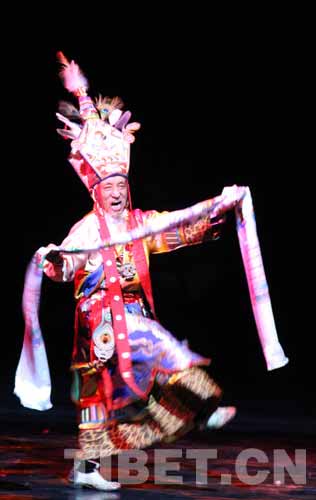
The famous folk artist Tubdain performed in the Tibetan ethnic dance drama “Hero Gesar”[Photo/China Tibet Online]
An aged man dressed in Tibetan costume, stepped onto the stage and started to chant along with the chorus.This is the opening scene of the dance drama "Hero Gesar" staged in the spring of 2012 in Beijing. It is hard to imagine that an epic narrator like him was once despised as a beggar.
The man, named as Tubdain, is a well-known narrator of the epic "King Gesar", and is also the first folk artist to present the epic on stage. According to the the audiences and critics, it is Tubdain's performance that perfected the entire dance drama.
"King Gesar", the longest heroic epic in human history, is widely spread among Tibetans and other ethnic groups in northwest China, and is transmitted orally by generations of narrators throughout history.In Tibet, there are a large number of narrative masters or bards like Tubdain, and local people call them "sgrung mkhan" which means the narrator of epic "King Gesar".
"They are real artists of the people, the most outstanding and popular poets of the people," said Jampel Gyatso, an expert in Gesar studies, and a researcher of the Institute of Ethnic Literature, Chinese Academy of Social Science.
"Without the folk narrators’ diligent work and devotion, the great epic 'King Gesar' would be buried by time and dust, which would be a loss for the Tibetans, and also a loss for the Chinese culture as a whole,” Jampel Gyatso said.
